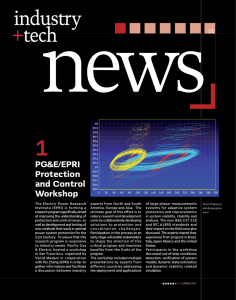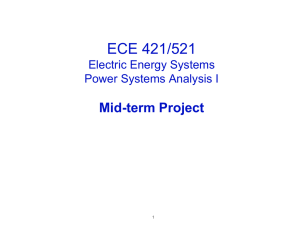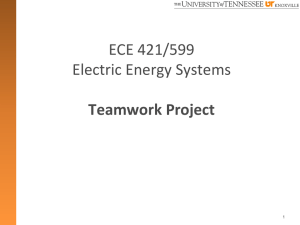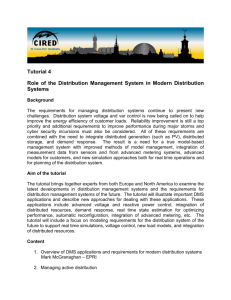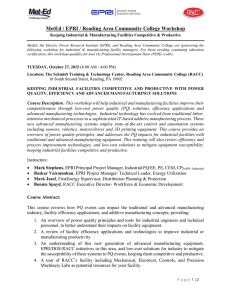Doing Business with the Electric Power Research Institute (EPRI)
advertisement
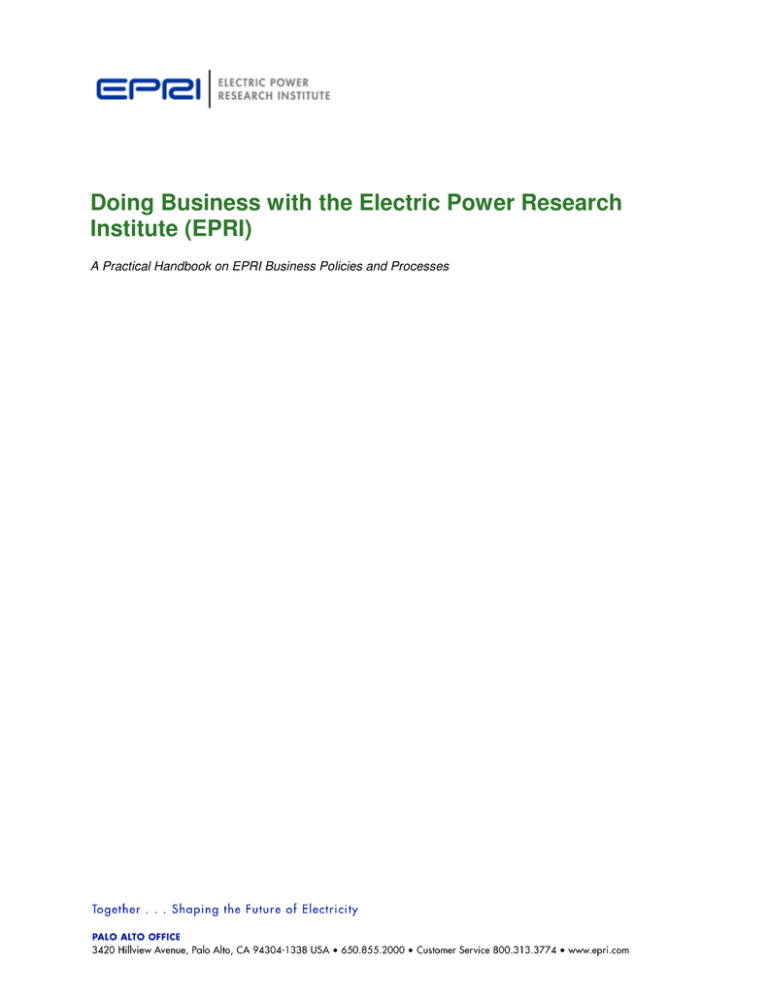
Doing Business with the Electric Power Research Institute (EPRI) A Practical Handbook on EPRI Business Policies and Processes Page 2 Table of Contents Table of Contents..........................................................................................................................................2 Contracting with EPRI ..................................................................................................................................3 Key Contract Terms .....................................................................................................................................4 Delivery of Research Results........................................................................................................................5 Other Terms and Conditions........................................................................................................................6 Administrative/Financial Reports .................................................................................................................9 Commercialization......................................................................................................................................10 Communicating with EPRI .........................................................................................................................11 Summary.....................................................................................................................................................11 Appendix A..................................................................................................................................................11 Appendix B..................................................................................................................................................13 Appendix C.................................................................................................................................................13 Page 3 To Our Contractors: This handbook reviews EPRI general business practices and expectations. It provides information regarding the contracting process, contract terminology, the delivery of research results, EPRI terms and conditions, and the value of commercialization. The requirements of a specific contract may differ from our general business practices. We suggest you consult contracts and project agreements as necessary to determine specific requirements. To provide background about EPRI and its mission, we have included as Appendix A, general information about the Electric Power Research Institute. Contracting with EPRI EPRI contracts for research and development through competitive selection of contractors. In this process EPRI staff develops a statement of work and a request for proposal (RFP) which the staff sends to interested, qualified organizations. If your organization submits a proposal, you are required to specify any exceptions taken to the contract terms and conditions. Also, you may be required to submit a commercialization plan with the technical and cost proposal. EPRI is committed to placing contracts as quickly as possible. The entire proposal package is evaluated by a review team with cost being only one factor in the team's decision process. The award will be based on your organization's understanding and compliance with EPRI objectives, technical merit, probability of success, benefits, cost, acceptance of terms and conditions, and, quite often, the amount of cost sharing or cofunding offered in the proposal. EPRI generally awards cost reimbursement contracts. Fixed-price contracts are awarded only in certain circumstances. EPRI's preference is to compete most contracts. However, in certain instances, EPRI will award sole-source contracts. Following acceptance of the proposal, EPRI's contract audit staff may review the cost proposal to ensure that all costs are reasonable and that the prospective contractor has the appropriate facilities, staffing, and accounting systems to accomplish the proposed work. Concurrent with the audit function, the contracts staff will proceed with contract negotiation; however, a contract may not be sent out until the contract audit staff has completed its audit of a first-time contractor. The contract provides a framework for the research effort by stating the rights and obligations of the parties. The contract consists of the EPRI general terms and conditions, applicable to all work to be performed by you as contractor, and the project agreements specifically tailored to each research effort. Each project agreement includes scope of work, period of performance, funding, and deliverables. It is EPRI's policy to ensure that technically and professionally qualified women, minorities and disabled veteran business enterprises (WMDVBE) are given a fair opportunity to do business with EPRI. Our objective is to increase such participation while maintaining our commitment to select the best-qualified, most cost-effective organizations to perform EPRI's research work. To assist EPRI in meeting this commitment, you need to inform EPRI of your status. You will also need to assure EPRI that qualified women, minorities, and disabled veteran business enterprises are given every opportunity to compete for any subcontract awarded under an EPRI prime contract. Page 4 Each research project will be assigned an EPRI technical manager, a contract negotiator or analyst, and in some instances including first-time contractors a contract auditor. The technical manager will be responsible for technical guidance and will ultimately review and sign-off on contract deliverables. The technical manager initiates and the contract negotiator or analyst must approve any possible contractual modifications during the life of the project. The contract will be amended only in writing and by mutual consent of the parties except changes in the EPRI project manager, period of performance, or other changes which EPRI is entitled to undertake unilaterally by providing written notice. These contract actions will be prepared by the contract negotiator or analyst, and, if applicable, costs incurred will be reviewed by the contracts audit staff. Key Contract Terms Committed Funds EPRI frequently issues multiyear contracts. Funding is authorized on an annual basis. The contract specifies annual funding limitations, which are the maximum obligation of EPRI. Records and Audit As a contractor, you must maintain accurate and complete records of costs incurred in accordance with generally accepted accounting principles. At its own expense EPRI reserves the right to audit the costs related to the contract on an annual basis and upon completion of the contract. Performance of any interim audits does not preclude further audit of costs, including indirect costs, in subsequent audits. Withholding A predetermined amount of contract funds is generally withheld pending completion of all deliverables and contract closeout requirements. This policy ensures compliance with all contract terms. Intellectual Property Due to funding EPRI provides, as well as its tax-exempt status, EPRI will generally take ownership of all intellectual property rights that arise in connection with the work performed under the contract. As contractor, you are not granted any license rights to this intellectual property in the contract. However, EPRI is very interested in commercializing the results of its research and welcomes inquiries on the licensing of the technology. It is generally preferable from both EPRI's and the licensee's point of view to negotiate the license after the technology has been developed and commercial potential can be evaluated. However, in many cases, EPRI is willing and sometimes encourages negotiation of a license concurrently with the research contract. Let's assume that you, as contractor, own background intellectual property rights necessary to practice the foreground technology being developed under EPRI contract. If so, you must agree to grant EPRI, on a royalty-free or reasonable royalty basis, a non-exclusive, worldwide license to practice the background technology, including the right to sublicense. When this situation arises, EPRI prefers to execute a crosslicense at the same time the research contract is executed. Insurance As contractor, you are required to maintain commercial general liability and automobile liability insurance, as well as worker's compensation insurance in the amounts designated in the contract. EPRI and its directors, officers, and employees must be named as an additional insured. Page 5 Termination EPRI has a clause in all of its contracts allowing EPRI to terminate the contract at any time for any reason. Contract costs incurred by the contractor prior to termination as well as reasonable cancellation costs will be reimbursed, except when the contract is terminated by EPRI for cause. Reimbursement, however, is subject to the committed funds limitation. Delivery of Research Results EPRI research contracts generally produce results in the form of intellectual property, software, technical reports, prototype equipment, or a combination of these products. The following information covers delivering these research results to EPRI. Invention Any invention or discovery you, your employees, or your subcontractors develop in the performance of an EPRI research contract must be promptly disclosed to EPRI, including a written description, the date of invention and the names of the inventors and others involved in its development. Sample invention and discovery disclosure formats are available from EPRI's Intellectual Property Department. EPRI owns all rights to inventions developed under the contract. Data Data and information developed under the research contract is owned by EPRI. To protect the intellectual property associated with this data, you cannot disclose this data and information without obtaining prior written approval from EPRI. In addition, the person or company receiving the information must sign a confidentiality agreement with EPRI. Software Any computer programs and related software developed during the course of an EPRI contract are to be supplied to EPRI in a form which may be used by others independently of any third party proprietary programs. To assure compatibility and standardization for EPRI software users, software deliverables listed in the project agreement are required to meet the guidelines set forth in the Software Development Requirements website. The software is transmitted to EPRI in source code, object code, and any additional form specified by EPRI. The number of copies and appropriate format are set forth in the project agreement as well. Formats include disk, magnetic tape, or other medium designated by EPRI. You must also supply EPRI with complete documentation. Technical Reports Technical Progress Reports. If required in the project agreement, you will submit technical progress reports to the EPRI technical manager at regular intervals. These reports include: Disclosure of all work accomplished Results achieved during the reporting period Nontechnical summary briefly describing the work and outlining important results Page 6 Final Technical Report . When the contract work is completed or terminated, you must submit a comprehensive final technical report to EPRI in compliance with the terms of the project agreement. It will cover all contract work accomplished, results achieved, conclusions, and recommendations. Please review the guidelines for the required format and content of the final report. EPRI may require that a draft be submitted prior to delivery of the final report. Interim Reports . If required in the project agreement, you will provide detailed interim reports in the frequency specified. These reports provide details related to the progress of the work to date and will include any and all results achieved to date. Property Property and equipment purchased or developed under the contract, such as prototypes, are EPRI's property and are delivered to EPRI upon completion of the contract. Property purchases under EPRI contracts require written authorization, and the property should only be used when performing the contracted work. Title to all tangible property purchased or developed under EPRI contract vests in EPRI at the time of acquisition. Accordingly, your organization's purchase orders should contain the following notation: As contractor, you must exercise reasonable care in the custody and maintenance of EPRI property. If any loss or damage occurs, you are to notify EPRI and repair or replace the property. You must also maintain the property free of any liens or encumbrances. EPRI will arrange to sell, dispose of, or abandon in place, any contract-purchased property following completion of the contract term or after being notified that the items are no longer in use. Your property records are to be maintained to facilitate compliance with local property tax requirements. The property list should include the description of items of property having a unit cost of $1,000 or more, supplier name, acquisition cost, and location. When appropriate, the manufacturer's model number and serial number will also be included. Your organization, on EPRI's behalf, may also be asked to prepare property tax documents required by local taxing authorities. EPRI requires written authorization before any modification is made to EPRI property. Should a change be made to the property, your organization must provide EPRI with a report detailing the costs incurred, a description of the change or improvement, and its location. During the performance of the contract, you must obtain all licenses, registrations, permits, and insurance required for the operation of any vehicles. These are either vehicles you acquire for performance of the contract, or those furnished by EPRI. Other Terms and Conditions Subcontracting Generally, contractors may subcontract portions of the work specified in the project agreement. The subcontracts must include important flow-down provisions from the contract and as contractor, you remain responsible for all work. Subcontract costs may be audited, and as such, an EPRI Form 112 is included with each proposal completed by the subcontractor. All EPRI accounting and audit policies and procedures apply to subcontract costs. If any changes are proposed by the subcontractor, EPRI must approve them in writing. Page 7 Publicity Neither you as contractor nor EPRI may issue publicity releases, including news releases and advertising, relating to the research contract (other than a brief announcement upon execution of the contract) without the prior written approval of the other party. Any inquiry you receive from the news media concerning the contract should be referred to the EPRI Public Information Department for coordination prior to response. During the "Period of Performance" or thereafter, any technical paper, article, publication, or announcement in connection with work done under EPRI contract should credit EPRI as the sponsor of the work. Financial Matters Allowable Costs. Your organization will be reimbursed for all reasonable, direct and indirect costs incurred in the performance of the contracted work. Please document your costs in accordance with generally accepted accounting principles and cost reimbursement practices. Reimbursement of independent research and development is allowable, but it is limited to the lesser of either your normal allocation of such costs or four percent of fully burdened labor costs. In those cases where EPRI is provided approved Government indirect rates, EPRI follows the Government cost recognition and reimbursement procedures when such costs are included in the original proposal. Sales, use, or property taxes assessed against you for work performed or assessed on equipment or materials purchased on behalf of EPRI are allowable. They are reimbursable provided such costs do not include those taxes from which EPRI is exempt. Details concerning EPRI's tax exemptions are included in Appendix B. The only travel costs, domestic or foreign, that you are authorized to incur are those included within the budget of the project agreement and approved in writing by the EPRI technical manager prior to the start of such travel. All travel within or outside of the United States will be reimbursed at no greater than a coach-fare basis. Unallowable Costs . Contingency costs, imputed costs, fines and penalties, losses on contracts, federal income taxes, and excess profit taxes are not reimbursable. A more detailed description of these costs is attached to this document as Appendix C. Invoices . Invoices should refer to the EPRI contract number. EPRI's payments will be sent to the address shown on the invoice. The invoice should break down the costs into a level at least as detailed as the Budget in the contract and include a column for cumulative contract-to-date costs. All invoices are mailed to EPRI or emailed at the following addresses: Electric Power Research Institute, Inc. Attn: Accounts Payable 3420 Hillview Avenue P.O. Box 10412 Palo Alto, CA 94303-0813 Epriinvoices@epri.com Page 8 Invoices for costs incurred and a pro rata portion of the fixed fee (if any) are submitted on a monthly basis. Each invoice will specify the monthly and cumulative contract expenditures, including an itemized statement of direct and indirect costs. Your invoice should show all amounts to be withheld by EPRI as a deduction. Invoices should include: Actual costs incurred during the invoice period, and either Pro-rated portion of the fixed-fee (if any), or deduction for the pro-rated portion of cost sharing (if any) EPRI is not liable for costs and fees that together exceed the contract cost limitation (CCL) specified in the contract or, on a yearly basis, exceed the cumulative committed funds for that year. Within one year after the completion or termination of the contract, you must submit a final invoice for all remaining costs incurred, including any amount withheld, and the remainder of the fixed fee (if any). Committed Fund Limitation . The committed funds represent the maximum amount you are authorized to expend or commit for the contract work as of the last day of the applicable year. EPRI is not obligated for costs, including the pro-rated portion of the fixed fee (if any), in excess of the applicable committed funds. EPRI's Contracts Business Unit will notify you of any changes in committed funds. Unless otherwise notified by EPRI, you may carry forward any unexpended committed funds into succeeding years. Excess Costs . As contractor, you are required to notify EPRI in writing if cumulative costs for the total project are expected to exceed 75% of the cost noted in the Contract Cost Limitation (CCL). You will also need to provide a revised estimate of the total cost to perform the contract work if you believe that you will exceed the CCL. If you are unable to complete the contract work within the CCL, EPRI may agree in writing to increase the CCL, delete portions of the scope of work to allow for completing the remaining contract work within the CCL, or terminate the contract. Accounting Procedures . Your accounting system should distinguish between direct and indirect costs. Costs are based on your accounting system procedures and practices that are in place on the effective date of the contract. Cost accounting practices that you use to accumulate and report costs during the performance of the contract, are to be consistent with the practices used in estimating costs for any proposal to which the contract relates. You should promptly notify EPRI of any changes in your accounting system that may affect the total estimated cost to perform the contract work prior to adopting any changes. Please include a potential cost impact calculation in the notification. EPRI will not be held responsible for any additional costs reflected in accounting procedures and practices that you may change during the period of performance unless previously agreed to in writing. Indirect Rates . The indirect cost rates used to estimate contract costs (including fringe, overhead, and G&A), are provisional rates unless otherwise specified and are subject to interim and final audit. The provisional rates may be revised for succeeding years for billing purposes, following approval by EPRI's corporate audit manager. As soon as possible, but not later than 120 days after the expiration of the fiscal year, you must provide the EPRI audit manager your proposed final indirect rates for that period. These rates should be based on your actual costs. At a minimum, they should include the actual account balances for all costs included in the indirect cost pools, as well as the basis over which the indirect costs are allocated. You and EPRI will finalize indirect rates as promptly as is practical in accordance with procedures acceptable to the EPRI corporate audit manager. Any payments upon finalization of indirect rates are subject to the CCL of the contract and availability of funds. If the submission is not received within the 120 days, the provisional rates used for billing are considered ceiling rates for the purposes of reimbursement of indirect costs under the contract. Page 9 Generally, contractors who do work with the Federal Government will provide EPRI with the benefit of the government indirect rates. In these instances EPRI will audit only the direct costs incurred under the contract. Indirect costs will be based on U.S. Government approved indirect cost rates. The 4% IR&D limitation will not apply. If you do not submit your proposed final, indirect rates within 30 days after submittal to the government, the provisional government rates used for billing will be considered ceiling rates for the purpose of reimbursement of any indirect costs. Refund to EPRI. If EPRI determines that any invoiced and paid amounts exceed the actual allowable incurred costs and any earned fixed fee, you are required to repay such amounts to EPRI within thirty days of request or as otherwise agreed upon by you and EPRI. If the repayments are not received, EPRI is entitled to withhold further payments. Administrative/Financial Reports Contractor Cost Performance Report If a Contractor Cost Performance Report (CCPR, EPRI Form 177) is required by the project agreement, EPRI will use the report to measure your financial performance under the contract. Prepare the CCPR, paying particular attention to actual costs incurred, forecast of remaining costs, and timely submission. Submit the form within fifteen days from receipt of the executed contract. The "Initial Forecast" will cover the period of performance or term of the contract. Reporting Requirements The monthly CCPR report reflects the "Actual Booked Costs" that were recorded during the previous period(s) along with the "Revised Forecast" to complete the work. The "Actual Booked Costs" must agree with the actual costs that have been recorded on your books. The forecast to complete the work reflects your best estimate of the expected spending profile for the remaining period of performance of the contract. The forecast lists monthly increments for the current calendar year and yearly increments thereafter. If your accounting books are not closed in time to report by the 15th of the month, a forecast for the current month may be used in lieu of an actual cost. In this case, the "forecast" cost for the month is inserted in the "actual" box. As contractor, you are required to send one copy of the CCPR to EPRI's Finance Business Unit. The CCPR should not be included with the invoice sent to Accounts Payable, as this will delay processing. The CCPR can be either mailed or faxed to the following address: Electric Power Research Institute, Inc. Attn.: Finance Business Unit 3412 Hillview Avenue P.O. Box 10412 Palo Alto, CA 94303-0813 Or FAX to: (650) 855-8854 If these reporting requirements are not followed, there may be a delay in processing your invoices. Page 10 Milestone Identification Report If required in the project agreement, you must provide milestone identification reports according to the requirements on the above-referenced form. Contractor Diversification Program Status Form You are required to submit an EPRI Diversification Program Status Form within 30 days of execution of the contract. If you are a private or public business, at least 51 % owned by a woman, minority, or disabled veteran, and your management and daily operations are controlled by one or more of these individuals, then you will be placed on EPRI's WMDVBE list. Additionally, you are required to complete a Subcontracting Plan and Reporting Requirements Form for all subcontracts expected to exceed $1,000. Commercialization EPRI seeks financial participation of potential commercializers (manufacturers, service companies, software vendors, etc.) in the research contract. This is done as early as possible to enhance the probability of successful technology transfer. Key to the selection of a participant is an indication by the prospective organization of its technical and financial commitment to the technology. Examples of this commitment can include a willingness to: Make available extensive background technology directly applicable to the EPRI contract-developed technology Provide significant cost-sharing toward the research costs Authorize the corporate resources necessary to bring the technology to the market Significant cost-sharing of the research contract is important, as it leverages EPRI's research dollars and provides a clear indication of a commitment to commercialize. Intellectual property rights are attained through the transfer of ownership or through the granting of licenses. Due to our tax status, EPRI prefers to grant non-exclusive licenses, especially when broad application of a technology is necessary for maximum benefit to the utility industry and its customers. The license grants the licensee certain rights, such as the right to make, sell, and use the technology in specific fields. In exchange, EPRI receives consideration in the form of license fees, royalty payments, and commitment to a commercialization project agreement. On occasion, EPRI grants time-limited exclusive licenses, but only where the grant of such exclusive rights is the only practicable manner in which the patent, copyright, process, or formula can be effectively utilized to benefit the public. The rationale supporting an exclusive grant must be documented and approved by EPRI executive management. A reasonable return on successful projects is important to EPRI and a factor in transferring the technology through ownership or license arrangements. EPRI pursues commercialization arrangements that represent the best interests of the utility industry through sound business practices while attempting to achieve royalty income that does not compromise commercial entry. Page 11 Communicating with EPRI The EPRI.com site provides the latest publicly available information about EPRI's extensive science and technology program as well as EPRI corporate information. EPRIweb, the members-only portion of the site accessible via ID and password, opens an additional area of the site, rich in EPRI proprietary information and intellectual property. If you feel that you are eligible for access to the EPRIweb portion of EPRI.com, contact your project manager and request an EPRIweb ID. Access may be contingent upon the specific duties you are being asked to perform. Summary Our objective is to make the process of contracting with EPRI as easy and straightforward as possible. We hope that this handbook provides you with helpful information concerning EPRI's contracting and licensing policies. For further information or clarification, please contact EPRI's Contracts Business Unit. Appendix A About the Electric Power Research Institute Mission . The mission of the Electric Power Research Institute (EPRI) is to discover, develop, and deliver high value technological advances through networking and partnership with the electricity industry. Membership . Funded through annual membership dues from hundreds of U.S. and international member utilities, EPRI's work covers a wide range of technologies related to the generation, delivery, and use of electricity, with special attention paid to cost-effectiveness and environmental concerns. Research Spectrum . At EPRI's headquarters in Palo Alto, California, hundreds of scientists and engineers manage thousands of ongoing projects throughout the world. Benefits accrue in the form of products, services, and information for direct application by the electric utility industry and its customers. Project Work . Project work is carried out by equipment suppliers, government and private laboratories, universities, and independent contractors around the world, each selected by EPRI on a project-byproject basis. Member utilities and their customers also serve as host sites for project demonstrations, thus gaining first-hand experience in the use of new technology. Page 12 Scale . Because hundreds of utilities pool their research funds in the EPRI program, the Institute is able to undertake developments on a scale that no single utility could handle. In addition, EPRI often cofunds projects with other research and development organizations, thus further leveraging its members' research investments. Relationships . Because of the breadth of its work, EPRI has developed strategic relationships with other research and development organizations throughout the world. EPRI cooperates in international research endeavors and serves as a clearinghouse of energy-related information for its members as well as for the scientific community. Products . Products range from newly developed hardware and software to information and processing techniques. EPRI also provides assistance to individual members on specific technical issues. Generation . In the area of generation, EPRI focuses on developing cleaner, safer, and more economical ways to produce electric power. Here products range from the development of robots for use in maintaining existing fossil and nuclear power plants to the development of entirely new systems, such as compressed air energy storage and solar photovoltaics. Delivery . EPRI develops efficient and economical ways to transmit, transform, and distribute electricity in harmony with the environment. Products range from computer software that designs and operates the delivery system to procedures that extend the life of delivery equipment. Energy Use . EPRI advances ways to use electricity more economically and efficiently in the home, in the office, and in the factory. Developments range from efficient space heating and cooling products for residential and commercial use to plasma and infrared processes for industrial use to electric vehicles for urban travel. Environmental Science . EPRI also carries out a major program of scientific research and analysis into health and environmental concerns such as electromagnetic field effects and global climate change. Technology Centers . In addition to its diverse products, EPRI offers its members and their customers technical support through a number of technology centers located across the country. The Nondestructive Evaluation Center, for example, offers services in inspecting power plant components, while the Power Electronics Applications Center advances the use of electronics for members' industrial customers. Page 13 Appendix B EPRI Property Tax Exemptions EPRI is exempt from property taxes in the following jurisdictions: Personal Property Real Property Alabama (Shelby County) Massachusetts (Pittsfield) District of Columbia New Jersey Massachusetts (Lenox & Pittsfield) New Mexico New Jersey New York (New York City, Yonkers, Somerset) New Mexico North Carolina Appendix C Cost Reimbursement Contracts - Allowable and Unallowable Costs Some selected costs are summarized below. If you have any questions concerning whether you'll be compensated for a particular cost, please contact the EPRI contract audit staff. Bid and Proposal (B&P) . Though EPRI accepts a reasonable indirect allocation of B&P expense, B&P is generally not accepted as a direct charge. B&P must bear an appropriate allocation of overhead. Compensation Costs . A guideline of 20% of direct and indirect labor is considered when reviewing compensation such as bonuses, pension, or profit sharing. Anything above this figure may be considered excessive. Contingency Costs . These costs represent risk, not cost, and are not reimbursable. Cost of Money . This is not a reimbursable expense unless in those cases where EPRI is provided approved Government indirect rates, EPRI follows the Government cost recognition and reimbursement procedures when such costs are included in the original proposal. Depreciation . Costs related to your fixed assets, if allocable and based on normal depreciation, is allowable until the asset is fully depreciated. Maintenance and normal repair, however, of these assets are generally not acceptable as a direct cost. Page 14 Fines and Penalties . Costs resulting from violation of, or failure to comply with, federal, state, or local laws and regulations are not reimbursable. General Purpose Equipment . EPRI does not accept general purpose test equipment or office furniture/equipment, including personal computers, as direct charges against its contracts. Imputed Costs . EPRI does not recognize any imputed amount as a reimbursable expense. Independent Research & Development (IR&D) . Reimbursement of IR&D is limited to the lesser of either your normal allocation of such costs or four percent of "Fully Burdened Direct Labor" unless in those cases where EPRI is provided approved Government indirect rates, EPRI follows the Government cost recognition and reimbursement procedures when such costs are included in the original proposal. IR&D is defined as direct labor costs, plus all allocable indirect expenses applied to the direct labor, exclusive of IR&D. Each division of a company and each year stand alone. IR&D labor reflects the same allocation of indirect costs, except for G&A, as work for customers. Insurance . Costs of insuring EPRI property at your facility are not reimbursable as a direct cost unless specifically required by the terms of the contract. General insurance costs are reimbursed through your indirect expense rates. Interdivisional Effort . EPRI accepts interdivisional effort only on a cost basis. No pyramiding of divisional profits is allowed. G&A will be allowable as it relates to interdivisional effort based on your normal accounting system. In addition, interdivisional effort is subject to IR&D limitation. Interest Expense . You will be compensated for interest paid or accrued in accordance with generally accepted accounting principles, only after the expense is netted with interest income. If you claim interest expense in your indirect rates you may not also claim the Cost of Money. Losses . Losses on EPRI contracts and other contracts are not reimbursable. Overtime . Unless specifically approved by the EPRI technical manager, these costs are not reimbursable. Taxes . Federal income taxes and excess profit taxes are not reimbursable. Sales, use, or property taxes assessed against you for work performed on behalf of EPRI are allowable. Such costs do not include taxes from which EPRI is exempt. You must execute documents and take any and all steps necessary to obtain the benefits of EPRI tax exemptions. Taxes paid for which exemptions were available (see Appendix B) but not exercised are not reimbursable. Use Charges . Amortized use charges applying to your equipment or facilities are allowable. Examples include acquisition costs, taxes, repairs, insurance, and maintenance. EPRI does not, however, accept amortization of acquisition cost beyond the point of full recovery.

